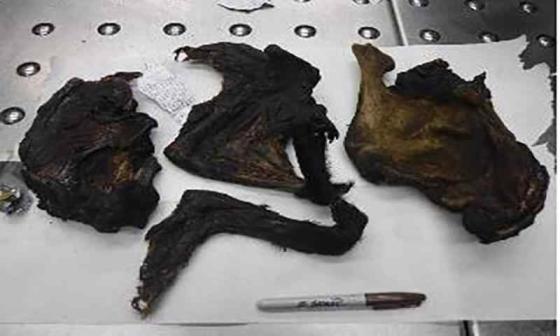Could Liberians' Appetite for Bushmeat Trigger the Next Ebola Outbreak?

During the last week of 2021, U.S. Customs and Border Protection (CBP) officers seized over 104 pounds of bushmeat.
In December, Liberians arriving or transiting through the Minneapolis – St. Paul International airport were stopped, fined, and, in some cases, arrested for importing bushmeat (wild animal), which is illegal in the United States.
So concerned, the Minnesota Department of Agriculture issued an advisory on January 14 warning Liberians that they could be fined up to $250,000 if they are caught smuggling bushmeat into the U.S. for sale or consumption.
U.S. customs agents at the airport said on multiple occasions, travelers from Liberia have been caught trying to bring bushmeat into Minnesota. The meat products were seized and destroyed along with all personal items that came in contact with the "dried meat."
Bushmeat is an essential source of protein for many Liberians, but it has a dangerous side to it. It is considered a virus vector and a cause of countless diseases. From COVID-19 to the Ebola virus, immunodeficient human virus (HIV), or avian flu, many diseases are zoonotic, meaning they originate from animals and are passed onto humans.
According to the U.S. Centers for Disease Control and Prevention, bushmeat is raw or minimally processed meat from wild animals, such as cane rats (groundhog or porcupine), monkeys, chimpanzees, and bats. It poses a potential risk of human infection with zoonotic viruses, including Ebola.
The bushmeat that has been confiscated is often smoked, dried, or salted. However, the agency believes these processes are insufficient to kill viruses and other pathogens in the meat.
"Educating Liberians and other Africans about the ramifications of bushmeat is a critical first step in the right direction," said Dr. Alfredmy Chessor, a family medical practitioner, and former Ebola response medical doctor.
The World Health Organization reports that zoonotic diseases account for roughly 75% of emerging diseases currently affecting humans. They also include yellow fever, various influenza, rabies, and Lyme disease. Many of these diseases can be traced back to the consumption of bushmeat.
The current coronavirus pandemic is just one example of zoonotic disease. Scientists believe the coronavirus crossed into humans from "reservoirs" — or its natural hosts. All it takes is consuming improperly prepared meat, a bite from an animal carrying the virus, or contact with an infected animal bodily fluid.
Could the practice of eating bushmeat, which is widespread across Liberia, be responsible for the next public health outbreak? Although Ebola isn't generally transmitted via food, public health researchers say it can spread through direct contact with a sick person's blood or bodily fluids, someone who has died from Ebola, or handling the carcasses of an animal carrying the virus.
It is well known that human infections have been associated with hunting, butchering, and meat processing from infected animals in Africa.
How then can Liberians minimize their appetite for consuming bushmeat (wild animals) to mitigate the risk of a zoonotic outbreak?
